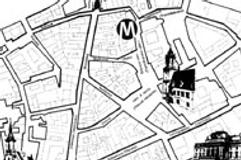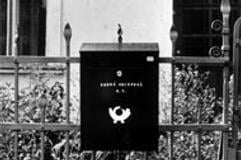Archive of articles - February 1998
If you desire to read an old article, use the search bar or select the publication date.
Finance Ministry takes action on capital market development
The market failed to produce any surprises during the past two weeks, keeping its bearish mood. SAX, the stock market index, reached a year low of 153.98 on February 9.The Security Traders' Association, in its analysis of the Slovak capital market, stated that the decline is caused by the lack of effective regulation. The Finance Ministry has not managed to regulate this market, the Association maintains, while suggesting further that the establishment of an independent security commission is the key to further development of the Slovak capital market. The Association also put forth a proposal for the legal anchoring of the commission, its financing and appointment of commissioners.
Around Slovakia
Antifascists gather peacefully as skinheads watchHistoric town redoes its facePetition against planned jailFewer visitors explore Slovak caves
New forex law won't hit crown says NBS
The National Bank of Slovakia (NBS) said on February 10 the crown was unlikely to come under pressure despite a new foreign exchange law which scraps the current limit on hard currency purchases by companies and individuals. The current law limits individuals to purchases of hard currencies equal to 60,000 crowns ($1,700) per year.The new law, approved by parliament last week, will come into effect on April 1, but the NBS is not afraid that hard currency reserves will ebb. "I don't expect people to start a massive exchange of crowns for hard currencies after the law is in force," said Karol Mrva, chief of the NBS's trade and foreign exchange department.Scrapping the annual limit on hard currency purchases is just one in a string of amendments to the foreign exchange law, approved by the NBS last year and aimed at the further liberalization of capital account operations to meet OECD standards.
United at last
Last November, the National Association of Real Estate Agencies of Slovakia (NARKS), was established as a successor to two professional organizations, the Association of Real Estate Offices of Slovakia and the Association of Real Estate Agencies of the Slovak Republic, which had been competing against each other since 1992. The creation of a single professional association of real estate agencies in Slovakia had a single driving idea behind it - improving the professional performance of companies active in the field.Slovakia's current real estate business is in a muddle, since according to Slovak legislation, anyone with a business license and a clean criminal record can launch a real estate agency. This enables hundreds of businesses to have their own "real estate agency", lowering professional standards within the field.
Reconstruction of a Family Album
Zuzana Mináčová is a leading Czech photographer, whose photographs depict human relationships and the link between man and nature. She belongs to a generation of artists who took the scene by storm in the late sixties to broaden the scope of expression used in photography.For years, she worked as a stills photographer at the Bratislava Film Studios. Now she lives in Prague. She has exhibited widely throughout Europe, and her work remains popular with the public and critics alike.Her photos can be seen until the 15th of March at an exposition in the Bratislava Municipal Gallery in the Pálffy palace. The exhibit has an unusual title - Reconstruction of a Family Album - and is dedicated to the memory of people of whom not a single photograph has survived.
The Spotlight
The full MontySeven years in tibetAmistadDevil's advocateTitanicThe Jackal
Ministers submit resignations
Economics Minister Karol Česnek and Social Affairs Minister Olga Keltošová submitted their resignations on February 19 to Slovak President Michal Kováč, presidential spokesman Vladimir Štefko said.Štefko said that neither of the two resignation letters included any reason for leaving. He added that Kováč would not be able to consider them before February 23 because of illness.A source close to Česnek said that "the Minister has wanted to resign for over a month, but he was just waiting until he could be sure of a suitable replacement." The story of Česnek's departure had first been broken by vice premier Sergei Kozlík on January 24, and then confirmed by HZDS spokesman Vladimír Hagara. "Kozlík made it sound as if the government wanted Česnek out, but it was actually the other way around," the source said.
Cozy atmosphere can't salvage dinner at the Pyramid Club
It is always an interesting experience trying to guess from its name what a Slovak restaurant will look like inside. When some friends invited my husband and I for dinner at the "Pyramid Club," just for a second I pictured attentive waiters bringing unimaginable delicacies to tables along the Nile River. But I've found it is unwise to approach a dining experience in this country with preconceptions, as the Pyramid Club proved once again.Archaeologists stand a better chance of finding a new pharaoh's tomb than customers have of locating this place. Try walking along Trnava's bustling pedestrian street from the center toward the train station, and keeping your eye out for a blue neon sign in an alley.
"Big is Beautiful" does not apply to Slovak banks
When the two largest Canadian banks, The Bank of Montreal and the Royal Bank of Canada, merged unexpectedly in December 1997, Canadian Prime Minister Jean Chrétien decided to put his foot down and have the Finance Ministry investigate the merger.He declared himself unhappy with the 'bigger is better' pronouncements of the financial and corporate sector. "After all," said the wiry Chrétien, "if I was 350 pounds, that would not make me a better prime minister."Chrétien would find his beliefs confirmed by recent developments in the Slovak banking sector, where small, tightly-run banks are surging and big state-run behemoths losing ground.
Changing of the guard
On February 16, two recently-elected candidates were inaugurated as Chief Justice and Deputy Chief Justice of the Supreme Court. Štefan Harabin, a 40 year-old judge from eastern Slovakia, was installed in the higher office, while Jozef Štefanko, 58, got the nod as his deputy. A third judge, Stanislav Lehoťák, who had been nominated by the government as a second Deputy Chief Justice, was not installed, having lost after government deputies refused to endorse him in Parliamentary elections on February 11.Despite the air of calm that surrounded the inauguration ceremony at the Supreme Court, the elections had been profoundly controversial. Independent judicial organizations had criticized both the candidates and the selection process, saying that the legally-required consultation procedures had not been observed by the government, and that political interference with judicial bodies was intensifying.
BRATISLAVA MUNICIPAL GALLERY & THE PÁLFFY PALACE
Expositions of Bratislava's Municipal Gallery take place in one of the most exquisite jewels of Bratislava's historical architecture, the Pálffy Palace, located in the heart of the historical city centre. During reconstruction of the building (1981-1987), excavators uncovered relics of the Roman Era of the l. st. century B.C. (including celtic coins and a mass grave), as well as artifacts from the Great Moravian Era at the end of the 9th century .From 1715, the owners of the palace were the Pálffy's, the hereditary lords of Bratislava county. Count Jan Pálffy (1829-1908) had the palace rebuilt in the second half of the 19th century in the severe late-classical style in which it appears today.
Residential: Future is now at Račianske mýto
Drivers who always get stuck at Bratislava's most congested traffic area, Račianske myto, will not be pleased to witness the rise of a futuristic new multi-functional complex, housing mostly apartments, starting this spring. Construction plans have already caused a great uproar among nearby inhabitants.Stavmal, a Slovak construction and investment company, is the principle investor and main supplier for the project. The building will stand right above a little rose park at Račianske myto, once a happy gathering ground for drunks at shaky kiosks that were levelled in 1997. Next to the building is the non-descript Pokrok shopping center, which holds computer, home appliance and food stores.
Constitutional Court ignored again
Peter Brňák, a HZDS deputy and Chairman of the Parliamentary Constitutional Law Committee, said that the ruling coalition majority in Parliament is not obliged to act on the February 6 Constitutional Court (CC) verdict. The court had ruled that the Interior Ministry had violated the fundamental rights of the plaintiff, Ivan Šimko, when it failed to distribute ballots containing the required four questions during last May's botched referendum on direct election of the President."I respect the [Court's] decision," Brňák said, before adding an Orwellian proviso. "There is one thing I would like to point out here, that the decision of the CC is just a statement of a decision, and this statement has its power of requirement to be fulfilled if the power is fulfilled with the statement, and everything else is, even if I shouldn't have said it this way, a political task."
New referendum set for April
With less than two weeks left as President of Slovakia, Michal Kováč has ignited a political firestorm in Slovakia by calling an April 19 re-run of last May's botched referendum on direct Presidential elections and NATO membership.The decision, handed down by Kováč on February 20, has been praised by opposition deputies as a brave defence of the fundamental rights of Slovak citizens, rights which the Constitutional Court (CC) said on February 6 were violated by the Interior Ministry last year. Government deputies, meanwhile, said Kováč's decision was vindictive and illegal, and that the results of the referendum would not legally bind Parliament to enact them.
Opposition plans reprivatization
The Slovak Democratic Coalition (SDK) unveiled on February 17 a new method of privatization that would be applied to sales of state property if the SDK were to win September's general elections.The announcement brought to a head years of widespread frustration with Slovakia's privatization process, which the opposition has recently shown to have disposed of valuable state assets at a fraction of their book value.Despite the apparent unity of the SDK in support of the new privatization plan, much remains to be agreed on the specifics of its application. One of the thorniest questions to be answered is that of how to deal with property already privatized. While all opposition parties agree that something should be done in specific cases where fraudulent sale can be established, very little consensus exists on how properly to compensate the state for massive property losses, without undermining the young Slovak investment sector.
- Pastoral letter divides Slovaks
- News digest: Slovakia is being hurt by its failure to integrate foreign workers, says auditor
- Hollywood turns Slovak highlands into high-speed playground Video
- News digest: ‘Charlatans and quacks’: Pandemic investigator accuses scientists, pushes for jab ban Video
- Authoritarian echoes from Delhi to Bratislava
- Top 10 events in Bratislava for foreigners
- A café in an ice cellar, sand dunes and a flower shop at the border
- Forget the spa – Bojnice’s trails are the real therapy Photo
- A café in an ice cellar, sand dunes and a flower shop at the border
- Top 10 events in Bratislava for foreigners
- Bratislava opens new support centre for foreigners
- News digest: ‘Charlatans and quacks’: Pandemic investigator accuses scientists, pushes for jab ban Video
- You say nazdar, I say dovi
- Pastoral letter divides Slovaks
- Neuroimmunologist Norbert Žilka: Slovakia in Alzheimer's research premier league
- Hollywood turns Slovak highlands into high-speed playground Video
- Bratislava opens new support centre for foreigners
- Hollywood turns Slovak highlands into high-speed playground Video
- You say nazdar, I say dovi
- A café in an ice cellar, sand dunes and a flower shop at the border
- Top 10 events in Bratislava for foreigners
- Independent cultural space on Bratislava embankment to end soon
- Záhorie uncovered: Slovakia’s quiet corner full of surprises Photo
- Chicken Jockey! Chicken Jockey! Chicken Jockey! Video
- Last Week: And then they came for the NGOs
- What abides: Giving a shit
- Slovakia brings back border checks with Hungary and Austria starting April 8
- Bratislava opens new support centre for foreigners
- Hollywood turns Slovak highlands into high-speed playground Video
- Štítnik resumes hand-crafting Christmas ornaments after 25 years
- You say nazdar, I say dovi
- A café in an ice cellar, sand dunes and a flower shop at the border
- News digest: Slovakia is being hurt by its failure to integrate foreign workers, says auditor
- Forget the spa – Bojnice’s trails are the real therapy Photo
- Košice steelworks sinks deeper into the red
- A 'pink moon' will grace Slovak skies this Sunday
- Authoritarian echoes from Delhi to Bratislava
- Weekend: A sports event to get your running fix Photo
- Record-breaking Bratislava Marathon supports visually impaired athletes
- News digest: ‘Charlatans and quacks’: Pandemic investigator accuses scientists, pushes for jab ban Video More articles ›







